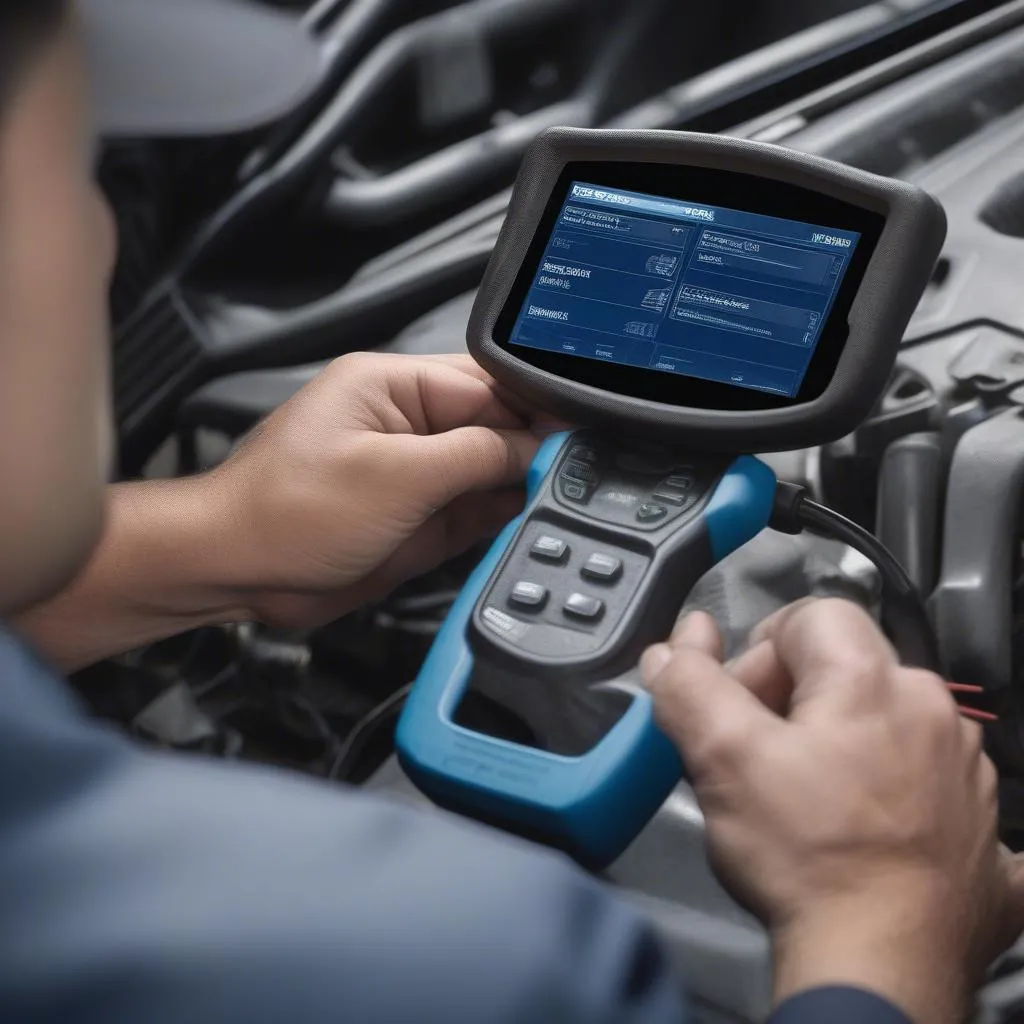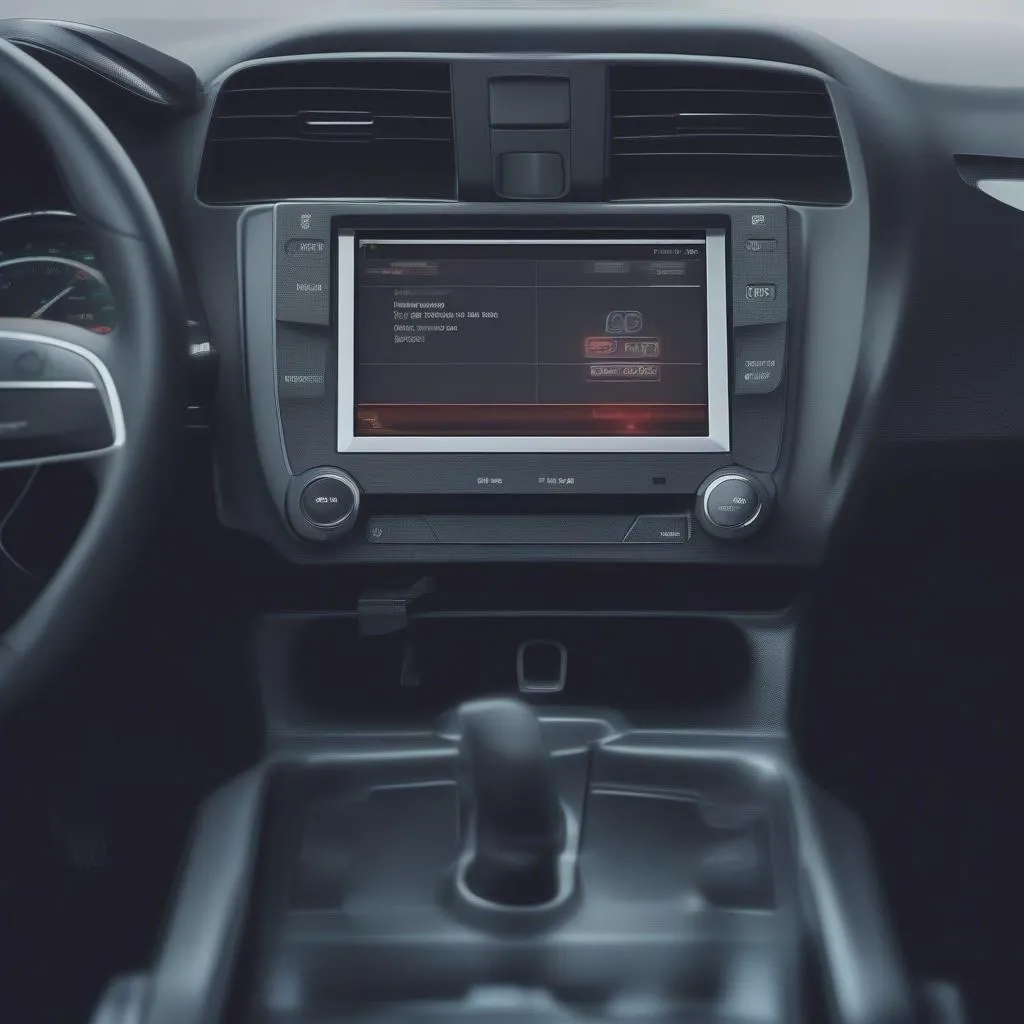Ever walked into a mechanic’s shop and felt a little intimidated by all the tech they use? We get it! One of the most common sights is an OBD scan tool plugged into a car’s system, spitting out codes like a secret language. So, which OBD scan tool do mechanics actually use? Let’s break it down, and trust us, it’s not as scary as it seems.
Understanding the Mechanic’s Perspective: More than Just a Code Reader
Imagine this: John, a seasoned mechanic in Austin, Texas, is faced with a 2018 Ford F-150 acting up. The owner, Sarah, describes a rough idle and a strange engine noise. Now, John could play the guessing game, but that’s time-consuming and costly. Instead, he turns to his trusty OBD scan tool.
You see, mechanics aren’t just looking to clear a “check engine” light. They need a tool that acts like a window into the complex world of a vehicle’s computer system. They need to see live data streams, analyze sensor readings, and pinpoint the root cause of the issue.
Deciphering the OBD Scan Tool Landscape: A Spectrum of Options
Here’s where it gets interesting. Just like there’s no “one size fits all” car, there’s no single OBD scan tool mechanics swear by. Their choices depend on a few factors:
1. Specialization:
- General Repair Shops: Mechanics working on a variety of makes and models might opt for a versatile OBD2 scanner like the Innova CarScan Pro or the BlueDriver Pro. These tools offer a good balance of features, code reading capabilities, and affordability.
- Specialized Shops: A mechanic specializing in BMWs or Mercedes-Benz vehicles might choose a dealer-level scan tool like the AUTEL MaxiSys MS908S Pro or the Launch X431 V+. These tools provide advanced programming functions, bi-directional controls, and access to manufacturer-specific systems.
2. Budget:
OBD scan tools range from budget-friendly options for DIYers to high-end professional tools costing thousands of dollars. Mechanics have to find a balance between features, performance, and what their business can afford.
3. User Experience:
Believe it or not, mechanics appreciate a user-friendly interface just like anyone else! Tools with intuitive software, clear navigation, and regular updates are often favored.
Unveiling the Mechanics’ Arsenal: Popular Choices
While the specific OBD scan tool a mechanic uses can vary, here are some names you’ll often hear tossed around:
- Autel: Known for their MaxiSys series, Autel offers powerful and versatile tools with wide vehicle coverage.
- Launch Tech: Launch’s X431 series is popular for its extensive diagnostic capabilities and user-friendly interface.
- Snap-on: A trusted name in the automotive industry, Snap-on tools are known for their durability and comprehensive features, often favored by experienced technicians.
- Bosch: Bosch, a giant in automotive technology, offers a range of scan tools, from basic code readers to advanced diagnostic systems.
Beyond the Basics: The Power of Advanced OBD Scan Tools
Here’s where things get really exciting. Remember John, our mechanic friend from Texas? He’s dealing with Sarah’s F-150, and the basic code reader just isn’t cutting it. This is where those high-end, professional-grade tools come in.
These tools don’t just read codes; they can:
- Perform bi-directional controls: This allows mechanics to test components (like actuators, solenoids, etc.) by commanding them on and off, helping pinpoint faulty parts.
- Access manufacturer-specific systems: Modern cars have complex modules for everything from airbags to infotainment. These tools can tap into those systems for in-depth diagnostics.
- Program and code modules: Replacing a control module often requires programming. Advanced scan tools allow mechanics to perform these functions without sending the car to the dealership.
**obd-scan-tool|Mechanic using advanced scan tool|A mechanic utilizing a professional OBD scan tool to diagnose a vehicle problem, with the tool displaying live data and diagnostic codes on the screen.**
Common Questions Mechanics Face (and the Tools That Help)
Here are a few questions mechanics often get asked, and how the right OBD scan tool helps them answer:
- “Why is my check engine light on?”: OBD2 scanners can retrieve and decipher those pesky trouble codes, pointing to the potential issue.
- “Can you reset my oil light?”: Many scan tools allow mechanics to reset service reminders, including oil life monitors.
- “My TPMS light is on. Can you check the tire pressure sensors?”: Some tools can read TPMS sensor data, helping diagnose tire pressure monitoring system issues.
Navigating the World of OBD Scan Tools: Tips for Car Owners
While you might not need a professional-grade scan tool, having a basic OBD2 reader can be empowering. It allows you to:
- Check for trouble codes yourself: This can help you understand potential issues before taking your car to a mechanic.
- Clear codes after minor repairs: For simple fixes, you might be able to clear codes yourself. However, remember, this doesn’t fix the underlying issue. If the light comes back on, further diagnosis is needed.
Need Help with Your Car’s Tech?
We understand that the world of car diagnostics can be complex. If you’re facing any issues or have questions about your vehicle’s electronics, don’t hesitate to reach out. Our team of automotive experts is here to help. Contact us on WhatsApp at +84767531508 for 24/7 support on diagnostic tools and related software.
**obd-scan-tool-diy|DIY OBD2 scan tool|A car owner using a basic OBD2 scan tool to check for trouble codes on their own vehicle.**
Keep Exploring the World of Automotive Technology
Want to learn more about OBD scan tools and car diagnostics? Check out these related articles:
- Hearststone Scan and Repair Tool
- Recommended Scan Tool for 2010 F250
- What Scan Tool Does Quick Learning
Understanding the tools mechanics use empowers you to be a more informed car owner. Remember, knowledge is power, especially when it comes to the health of your vehicle.


